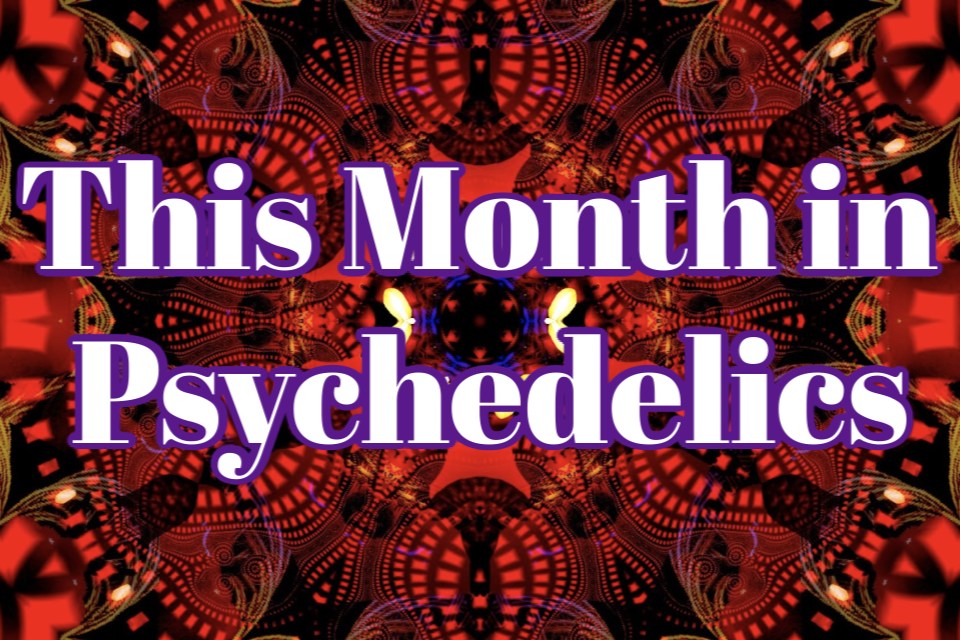A lot happened this month, including three more U.S. cities that decriminalized psychedelics, two European countries that are slated to legalize cannabis soon, the truth about official warnings involving laced Halloween candy, results from the latest psychedelic research studies, and some examples of why psychedelic drug policy reform future is here—it’s just not very evenly distributed yet.
Here’s a video version of this month’s recap if you’d prefer to watch the update instead:
There’s a lot to get through this month, so without further ado, let’s jump into the news:
Policy
Wins
Three U.S. cities decriminalized psychedelics in October. Now Seattle, WA, Arcata, CA, and Easthampton, MA have joined the growing ranks of municipalities choosing to put an end to criminalizing the possession, use, and cultivation of psychedelics.
Across the pond, Luxembourg is expected to become the first country in Europe to legalize cannabis, with Switzerland following close behind.
Future
Looking to the future, voters in the U.S. will have the opportunity to weigh in on several cannabis and psychedelic ballot measures next week, the United Kingdom’s Prime Minister Boris Johnson is considering relaxing restrictions involving psilocybin, Denver is thinking about expanding its psilocybin decriminalization experiment, and Mexico may finally legalize cannabis within the next few weeks.
Industry
The psychedelic industry is still quite young, but it may have the potential to completely change our conception of work forever. All kinds of new jobs in the field are opening up, and ethical concepts like privacy, indigenous reciprocity, and professionalism are still being sorted out. But one thing’s for sure—psychedelics are here to stay.
One intriguing aspect of the growing psychedelic industry is the emergence of ketamine clinics popping up all over the place. They are innovative and may serve as a helpful blueprint for other legal psychedelic therapies.
Research
Published Studies
Several studies were published this month, but two stood out from the rest of the pack. The first study took a look at people who have used psychedelics and found that those who tried the drugs even just once tend to have a lower incidence of both heart disease and diabetes.
The second study found that small group psilocybin therapy for cancer patients achieved remission of major depression symptoms for 50% of participants, demonstrating not only the possibility of treating mental health disorders but also the feasibility of administering psilocybin in groups rather than sticking to the more common individual-based therapy option.
Future Studies
With a surprising 180-degree turn-around, the DEA has proposed a dramatic increase in the production of cannabis and psychedelics for research in 2022. This would enable more psychedelic research to be conducted and it’s a refreshing signal from the federal law enforcement agency that has traditionally stood in the way of such research in the past.
MindMed announced a forthcoming study that will look at treating social anxiety associated with autism spectrum disorder with R(-)-MDMA.
Research Centers
And Toronto’s University Health Network is opening Canada’s first psychedelic therapy research center for mental health with the help of a $5 million donation made by tech entrepreneur and venture capitalist Sanjay Singhal.
Harm Reduction
As usual, scare stories about unknowingly dosing children with laced Halloween treats have been making the rounds again this year. State officials sounded the alarm about psychoactive candy and snacks but research has shown that there still haven’t been any incidents of children being killed or seriously injured by contaminated Halloween treats.
If you take the time to think it through, drug dealers and users alike are just not going to waste their money or substances to unknowingly dose children. It doesn’t make any sense, yet officials use this time of year to warn parents about a seriously-unlikely danger anyway.
Miscellaneous
Next is a reminder that although many places around the world are relaxing their attitudes toward drug policy, some countries are still heavily punishing people for possessing, using, or distributing drugs. Two examples of this came up this month, including a man who will be hanged in Singapore for importing roughly two pounds of cannabis and a British man was given a 25-year prison sentence in Dubai after being caught with four bottles of CBD vape oil. Those of us who live in less punitive locations ought to remind ourselves that we are fortunate to not face these extreme punishments and we should continue fighting for the reform of drug policies around the world.
If you or someone you know often throws up when coming up on MDMA, that may be due to intense euphoria rather than a sign of toxicity. Since the drug causes serotonin production in the brain to increase, and serotonin stimulates the part of the brain that controls nausea, a sudden flood of the neurotransmitter could be responsible for the occasional up-chuck that some people experience during the first portion of a roll.
And wrapping up this month’s recap is a story about the world’s largest collection of LSD art. If you’re a fan of blotter art then it’s definitely worth checking out!
That’s all for this month’s update. Remember to always test and weigh your drugs and until next time—keep thinking wilder.
Think Wilder is reader-supported. If you enjoyed this month’s update, please consider helping out by becoming a patron, making a one-time donation, or sharing this post with a friend. Thank you for your support.


